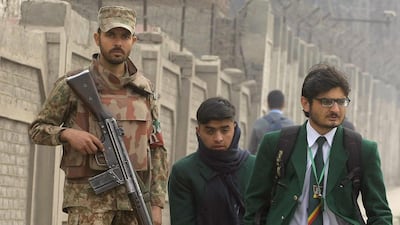Pakistan is a country that evokes strong emotions, particularly among those who know it best. It is one thing for the general observer to chastise it from a distance, because of its reputation as a sanctuary-cum-hatchery for terrorists. It’s quite another when those who have worked closest with Pakistan to turn the tide of its militant insurgency complain bitterly of duplicity.
That's why, in the aftermath of last month's massacre of schoolchildren in Peshawar, the Pakistani government's declaration of war against all terrorists and extremists has been received with as much scepticism as optimism.
Ultimately, the verdict will be based on action taken against Pakistan-based militant groups that have used its territory against its neighbours.
Of equal importance to observers is the extent of change in the national conversation within Pakistan.
Public opinion is usually quite susceptible to manipulation. That’s not been the case since the school massacre and the government has struggled to adapt. Predictably, the usual tactic – restricting media reporting of the militant side of the story – has not worked because public emotions are running so high, and the media and elected representatives have responded accordingly.
The military has had to watch its step, after the army chief of staff leaned a little too hard on politicians to grant him sweeping powers to deal with terrorists and their sympathisers. It wasn’t that the introduction of military trial courts was unpopular, it was simply that the democrats were deeply suspicious that the military had ulterior motives, and justifiably so.
So Pakistanis now have a chance to determine the course of events in their country, possibly to an unprecedented extent. Whether they would help change negative perceptions of their country depends largely on their collective ability to interpret the doctored flow of information.
That is a big ask for a public that has been denied the opportunity to examine the facts of Pakistan’s conflict with home-grown terrorists because of a sustained, rigorously imposed state campaign of denial and distraction.
That challenge has been further complicated by decades of collusion between the state and political mullahs, which has attuned public opinion to radical Islam, and suppressed any resistance of the concept.
As a consequence, most Pakistanis are so used to living in a bubble of state-created denial that they have either embraced the falsehood, or are scared to challenge it.
It is happening, nonetheless, because the Peshawar massacre has struck the heart of Pakistan’s middle class, upon whom the civil-military leadership depends to quietly drive the state’s machinery, manage the private-sector economy, staff the judiciary, and direct the media narrative. The attack has turned that conformist class into an angry and powerful pressure group at the heart of government, and it is making its presence felt by challenging the narrative of the state.
A common example is growing disbelief about the military’s bulletins of successful actions against insurgents in their tribal area strongholds. Unwisely, they routinely include statistics of the number of militants killed in aerial attacks – whereas it’s obvious, from the reliance on air power, that the military does not have the on-ground resources to accurately report the facts. People are asking for evidence of the counted corpses, and wondering why they have not included the big fish of the Haqqani Network.
Pertinent to the international community, a growing number of Pakistanis are asking why, if there is no longer any distinction between “good and bad” Taliban, the state has not moved decisively against the Jamaat-ud-Dawah group.
That is representative of a rapid evolution of the public discourse since the December 16 tragedy in Peshawar.
Initially, sentiment towards India was tainted with anger at ongoing border skirmishes, painted as a stab in the back at Pakistan’s time of grief. Seizing the opportunity, officials accused India of funding the Afghanistan-based Pakistani Taliban responsible for the school attack.
It was rubbish, and it didn’t take the middle class long to arrive at that conclusion. Fine, they said, there’s no doubt India’s our enemy, but that enmity must be conducted directly by the state, not by proxies who can’t be trusted because they are terrorists, too.
Of course, that does not mean the state has lost control of the overall narrative – merely, Pakistanis want to feel safe, and expect their government to deliver on security, so that they can get on with their lives.
From now on, the Pakistani state will have no choice but to become more honest and open, both in the narrative it presents to its people, and in quid pro quo dealings with its neighbours and the broader international community.
The pace of that change, sadly, would be determined not by the government, but by the terrorists’ inevitable use of further attacks on soft, middle-class targets, to manipulate public opinion.
Tom Hussain is an independent journalist and political analyst based in Islamabad
On Twitter: @tomthehack

